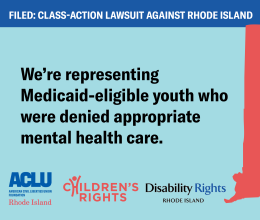The ACLU of Rhode Island has today filed a lawsuit in R.I. Superior Court over the R.I. Board of Education’s (BOE) failure to consider a petition filed last month by seventeen organizations to do away with the Board’s “high stakes testing” graduation requirement. The lawsuit, filed by ACLU volunteer attorneys Marc Gursky and Elizabeth Wiens, argues that the Board had an obligation under state law, which it ignored, to consider the proposal and either reject it or initiate a formal rule-making process to consider its adoption.
As a result of the high stakes testing requirement, which is scheduled to take effect in 2014, approximately 4,000 students face the risk of not graduating next year because of their scores on the current test, known as the NECAP. The BOE’s failure to consider the groups’ petition is thus no small matter.
The Board of Education has been in existence for almost seven months, but has never formally discussed or voted on this controversial requirement, despite extensive public comment the subject has received at Board meetings. Under the Administrative Procedures Act, the BOE had thirty days to respond to the petition, submitted on June 21st, either by denying or it by initiating a public rule-making process where testimony could be accepted and the Board could, as the petition noted, “consider in a timely but deliberate manner whether to accept, modify, or reject this proposal.” Instead, on July 13, BOE Chair Eva-Marie Mancuso denied the petition on her own, citing “temporal circumstances” and stating that the BOE would be receiving “an in-depth informational briefing on the relationship between large-scale assessments and graduation requirements” at a Board retreat scheduled for August 24 and 25. Two days after that letter was sent, the BOE held a regular monthly meeting where it did not address the petition.
Numerous questions have been raised about the validity of the NECAP test (and others) as a high stakes testing tool. When the NECAP was introduced in Rhode Island, the Department of Education specifically acknowledged that it should not be used for making graduation decisions. A comprehensive 2011 study by the National Research Council concluded more generally that “high school exit exam programs, as currently implemented in the United States, decrease the rate of high school graduation without increasing achievement.”
Last month, the General Assembly entered the fray by approving a resolution calling on the BOE to delay implementation of the high stakes requirement. Providence Mayor Angel Taveras made a similar request a month earlier. In a letter accompanying the petition in June, the organizations argued that, rather than educating students, the requirement has led to too much time being spent teaching to the test. In fact, last month, RIDE supported legislation that explicitly authorized school districts to yank students out of core classroom activities to prep for the test if that was deemed to be in the student’s “best interest.”
ACLU attorney Wiens noted today: “While we ultimately hope that the Board adopts our proposed amendments to the NECAP graduation requirements, at this juncture, we are simply asking the Board to consider our petition as the law requires.”
ACLU of RI executive director Steven Brown added: “Literally thousands of students’ lives are in limbo, and every month’s delay in grappling with this problem means increased anxiety and uncertainty for those students and their future plans, as well as for their families. That is why we felt that the Board’s consideration of our petition in a timely manner was so critical, and why its failure to act has necessitated this suit. There is a momentum and urgency that the issue demands, and the Board’s failure to either initiate rule-making proceedings or deny our petition undercuts the purpose of the APA petition process. The Board must take responsibility, one way or another, for the fate that is awaiting 4,000 students.”
Rick Richards, a plaintiff and former employee in the Department of Education’s office of testing, said in a written statement: “The Board already knows that the NECAP was never designed to test the knowledge students need to graduate, and that it causes curriculum, teaching and learning to become narrower and shallower, damaging the quality of the educational process. It is time to act on what we already know and eliminate the NECAP as a graduation requirement.”
Priscilla Rivera, a member of the Providence Student Union and a Hope High School senior who is in danger of not graduating due to her NECAP scores, described how her classes changed to “teach to the test” once the NECAP results came out. She also explained its personal effect on her: “If you’ve been to college, you remember how stressful the college application process was. Now imagine how much harder it would be if you weren’t even sure you could graduate. And though I should be spending my summer and fall focusing on applying to college, I know I’ll keep obsessing about the NECAP all the way through October (and maybe all the way through the spring). How is this going to help me succeed?”
Sol Camanzo, a junior at McDaniel College, who said she did poorly on the math portion of the NECAP while in high school, issued a written statement saying: “I am living proof that this form of evaluation is not accurate. I was given the opportunity to walk across the stage and focus on my first year in college, regardless of what score I got on the NECAP test. I was successful and I continue to be successful. I refuse to let a test score define me or what I am capable of. I hope the Board of Education learns a lesson from my story and acknowledges that there are students who are in the same position I was.”
The lawsuit asks the court to declare that the BOE’s failure to consider the petition violates the APA and to direct BOE to consider the petition “forthwith.” Besides the ACLU, plaintiffs in the lawsuit are the Providence Student Union, Rhode Island Disability Law Center, Rhode Island Teachers of English Language Learners, RI Black Business Association, Tides Family Services, Direct Action for Rights and Equality, and two ACLU members who have been active on the issue, Rick Richards and Tom Sgouros.
More information about the ACLU's ongoing campaign to end high stakes testing graduation requirements can be found here.
Photos from the Press Conference:








